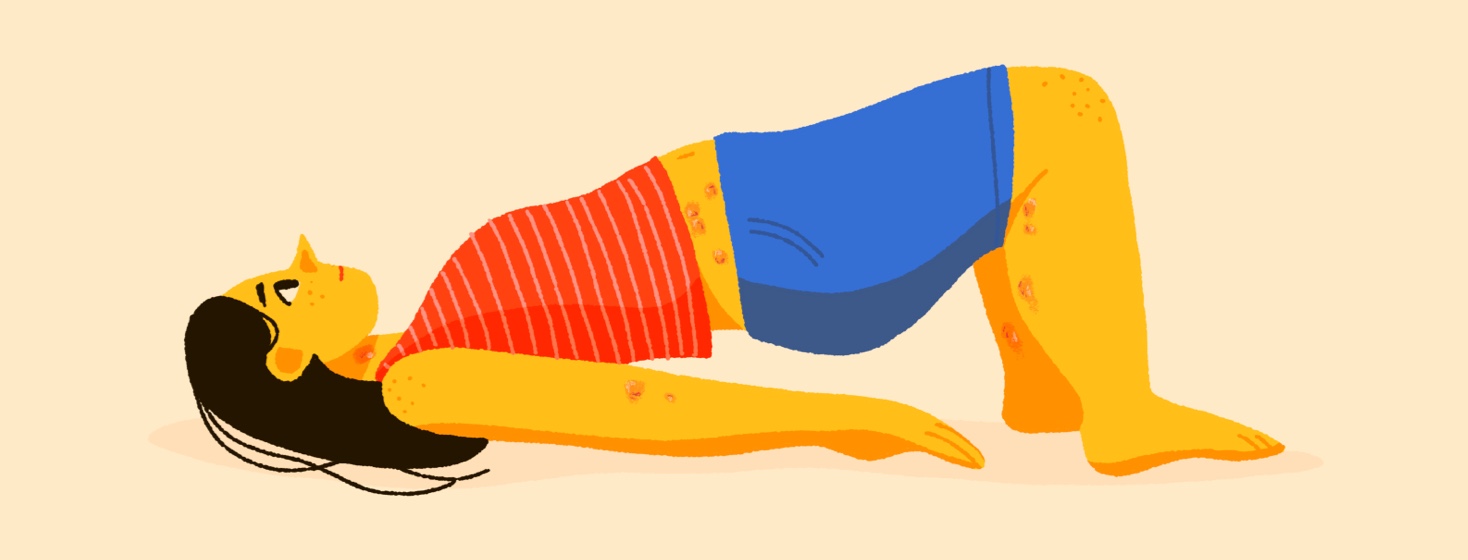Obesity and Psoriasis
My entire life, I have been considered to medical professional standards "obese". As a kid, I remember our family switching from whole milk to 2%. My Mom told us the doctor wanted us to have it to help us lose weight. Honestly, the yo-yo dieting, ups and downs with my weight mimic the rollercoaster ride of psoriasis flares and remission.
There was no surprise as I began researching more about my health that being overweight or obese is considered a risk factor for psoriasis. Experiencing the challenges related to my weight especially during an active flare pushes me to want to take better control on decreasing my weight and managing a healthier lifestyle.
Inverse ouch
It had never really occurred to me that there could be a connection between my weight and psoriasis. I became aware during an appointment with my dermatologist. I was showing her and explaining different symptoms I had never seen before. Under my breasts were extremely dark, and my skin extremely thin and burning. I was so afraid and didn't know what was going on. Fear and overthinking almost crippled me since I had never experienced this. I was used to plaques, but this was different. Not to mention embarrassing.
Featured Forum
View all responsesAt the time that I noticed under my breasts, the same symptoms in the inner upward part of my thighs began. Showing her is when I first heard the term inverse psoriasis. Inverse psoriasis often occurs in the folds of the skin. This was something completely new to me. She shared that often those who are obese or have other risk factors may experience inverse psoriasis. In my head I had already determined what I was going to do, but not before a different eye-opening revelation.
Starting to experience joint pain
Joining the 40 club, I knew would come with some extra aches and pains, but not what I was experiencing. I shared with my doctor I was having a lot of joint pain. There were days I could barely move, and I could hear every crack in my body. Bloodwork and an appointment with my rheumatologist would reveal my psoriatic arthritis. At my appointment with the rheumatologist, she explained that weight can impact my joints and symptoms I was experiencing.
The rheumatologist recommended stretches, and even programs that I could do to manage my symptoms. She said managing my weight and even changing my diet could help decrease inflammation. I didn't need any more confirmation.
Getting started
Once I had become aware that my weight could be a culprit in my body experiencing inverse flares and increased joint pain, I decided to become more active. I didn't join a gym, or even leave my house. I literally started by walking up and down the basement stairs 30 minutes a day. 5:30am, many days started with a stretch and my nights ended the same. Over time I added different exercises and found programs I love to do. Eventually the weight started coming off, and I noticed a change in my body specifically with my joints. I took it a step further and fell in love with fitness so much that I became a group fitness instructor to keep myself committed to remaining active.
As with anything in life, there are ebbs and flows. As I got comfortable in remission, I got more lax. I didn't work out as much and I eventually gained several pounds back. Loop that in with the increased fatigue and things seem to have gotten a bit more difficult. I am now pushing myself to just start especially seeing that the shift in my improvements did lessen as I fell back on keeping active and gained weight. On top of it all, I started to have intermittent flares.
Continue the push
Often, we hear in our doctors' offices lose weight, and for me as annoying as it can be to hear, it's something that I know can help improve my health. I don't want to experience the other comorbidities such has heart disease, diabetes, etc. in addition to my psoriasis. It is very hard to get back up again but I know that I have some level of control in being proactive in my health.
It's crystal clear to me that when I was more active and had lost weight I felt better, and my psoriasis symptoms were better controlled. Once I went backwards, so did most of my improvements. I recommit myself each day to make a better decision to help improve my health. Knowing more about the connections with obesity and psoriasis has made me more aware.
Have you also been told that losing weight or starting a weight management program can lessen or improve your symptoms? I'd love to hear what has helped you the most.

Join the conversation